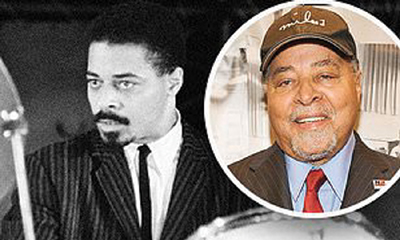Written By NewsOne Staff
(Source NewsOne):
While death is inevitably a part of life, that truth doesn’t make it any easier to say goodbye to those who have died. This running file commemorating some of the notable Black folks who have died in 2020 is meant to pay homage to their contributions in life that will live on well after their deaths.
Jimmy Cobb, the legendary jazz drummer who kept the beat going for many of the genre’s greats including Miles Davis, died May 25. NPR reported that Cobb’s wife confirmed the cause of death was lung cancer. He was 91-years old.
Earlier this year, his daughter announced her father was experiencing financial as well as medical problems. She reminded her father’s fans of his accomplishments, including the fact that he “recorded the highest selling jazz record in history “Kind of Blue” at age 30.” A GoFundMe account was started in January to raise money for Cobb’s health care and was nearing $100,000 at the time of his death.
Wilson Roosevelt Jerman, a former longtime butler who worked in the White House, died following complications from the coronavirus. He was 91-years old. Jerman served 11 presidents, including Barack Obama, the nation’s first Black commander-in-chief. Fox News reported that “Jerman worked at the White House from 1957 to 2012 as a cleaner, a doorman, and butler.”
Shad Gaspard, a professional wrestler-turned actor and author, was found dead on May 20 after he went missing while swimming at a beach in California days earlier. He was just 39 years old. Gaspard, a former star with the WWE, was caught in a strong rip current with his 10-year-old son. Lifeguards responded but Garspard insisted they save his son first. Lifeguards said when they returned, “a wave had crashed over Mr. Shad Gaspard and he was swept out to sea.”
Actor Gregory Tyree Boyce was found dead in his Las Vegas condo on May 13, according to widespread reports. Boyce was 30 years old. He and his girlfriend were found dead together. Natalie Adepoju was 27 years old. There was no cause of death reported with the deaths. Boyce was best known for his roles in the movies “Twilight” in 2008 and “Apocalypse” in 2018.
Memphis civil rights activist, city councilmember and businessman Fred L. Davis, who marched with the Rev. Dr. Martin Luther King Jr. during a historic labor strike, died on Tuesday following an illness. Davis made history when he was elected the Memphis City Council in 1967, joining two other newly elected Black people as the city’s first African American council members. The next year, when the city’s sanitation workers protested their working conditions and low pay, Davis and King were among those marching in the workers’ support. Davis also opened one of the first Black-owned insurance companies in the south. In addition, he and his wife worked to desegregate the city’s schools.

